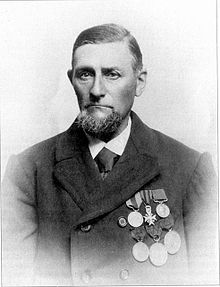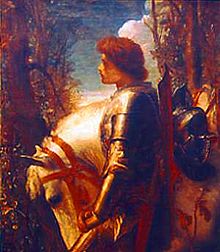- Hero
-
For other uses, see Hero (disambiguation)."Heroism" and "Heroine" redirect here. For the film, see Heroism (film). For other uses of Heroine, see Heroine (disambiguation)."good guy" redirects here. For other uses, see The Good Guys (disambiguation).Not to be confused with heroin.
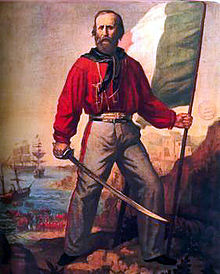 Italian national hero Giuseppe Garibaldi has been dubbed the "Hero of the Two Worlds" in tribute to his military expeditions in both South America and Europe
Italian national hero Giuseppe Garibaldi has been dubbed the "Hero of the Two Worlds" in tribute to his military expeditions in both South America and Europe
A hero (heroine is usually used for females) (Ancient Greek: ἥρως, hḗrōs), in Greek mythology and folklore, was originally a demigod, their cult being one of the most distinctive features of ancient Greek religion.[1] Later, hero (male) and heroine (female) came to refer to characters who, in the face of danger and adversity or from a position of weakness, display courage and the will for self sacrifice—that is, heroism—for some greater good of all humanity. This definition originally referred to martial courage or excellence but extended to more general moral excellence.
Stories of heroism may serve as moral examples. In classical antiquity, hero cults that venerated deified heroes such as Heracles, Perseus, and Achilles played an important role in Ancient Greek religion. Politicians, ancient and modern, have employed hero worship for their own apotheosis (i.e., cult of personality).
Contents
Etymology
Sir Galahad, a hero of Arthurian legend, detail of a painting by George Frederic Watts
Coined in English 1387, the word hero comes from the Greek "ἥρως" (heros), "hero, warrior",[2] literally "protector" or "defender"[3] the postulated original forms of these words being *ἥρϝως, hērwōs, and *ἭρFα, Hērwā, respectively. It is also thought to be a cognate of the Latin verb servo (original meaning: to preserve whole) and of the Avestan verb haurvaiti (to keep vigil over), although the original Proto-Indoeuropean root is unclear.
According to the American Heritage Dictionary of the English Language, the Indo-European root is *ser meaning "to protect". According to Eric Partridge in Origins, the Greek word Hērōs "is akin to" the Latin seruāre, meaning to safeguard. Partridge concludes, "The basic sense of both Hera and hero would therefore be 'protector'."
Classical hero cults
Main article: Greek hero cultHero cults could be of the utmost political importance.[original research?][clarification needed] When Cleisthenes divided the ancient Athenians into new demes for voting, he consulted the Oracle of Delphi about what heroes he should name each division after. According to Herodotus, the Spartans attributed their conquest of Arcadia to their theft of the bones of Orestes from the Arcadian town of Tegea.
Heroes in myth often had close but conflicted relationships with the gods. Thus Heracles's name means "the glory of Hera", even though he was tormented all his life by Hera, the Queen of the Gods. Perhaps the most striking example is the Athenian king Erechtheus, whom Poseidon killed for choosing Athena over him as the city's patron god. When the Athenians worshiped Erechtheus on the Acropolis, they invoked him as Poseidon Erechtheus.
In the Hellenistic Greek East, dynastic leaders such as the Ptolemies or Seleucids were also proclaimed heroes. This was an influence on the later, Roman apotheosis of their emperors.[citation needed]
Analysis
The classic hero often came with what Lord Raglan (a descendant of the FitzRoy Somerset, Lord Raglan) termed a "potted biography" made up of some two dozen common traditions that ignored the line between historical fact and mythology.[citation needed] For example, the circumstances of the hero's conception are unusual; an attempt is made by a powerful male at his birth to kill him; he is spirited away; reared by foster-parents in a far country. Routinely the hero meets a mysterious death, often at the top of a hill; his body is not buried; he leaves no successors; he has one or more holy sepulchres.
The first Hero:
Hero (mythical priestess), in Greek mythology, priestess of Aphrodite, goddess of love, at Sestos, a town on the Hellespont (now Dardanelles). Hero was loved by Leander, a youth who lived at Abydos, a town on the Asian side of the channel. They could not marry because Hero was bound by a vow of chastity, and so every night Leander swam from Asia to Europe, guided by a lamp in Hero's tower. One stormy night a high wind extinguished the beacon, and Leander was drowned. His body was washed ashore beneath Hero's tower; in her grief, she threw herself into the sea.
The validity of the hero in historical studies
Further information: Philosophy of history and Great man theoryThe philosopher Hegel gave a central role to the "hero", personalized by Napoleon, as the incarnation of a particular culture's Volksgeist, and thus of the general Zeitgeist. Thomas Carlyle's 1841 On Heroes, Hero Worship and the Heroic in History also accorded a key function to heroes and great men in history. Carlyle centered history on the biography of a few central individuals such as Oliver Cromwell or Frederick the Great. His heroes were political and military figures, the founders or topplers of states. His history of great men, of geniuses good and evil, sought to organize change in the advent of greatness.
Explicit defenses of Carlyle's position were rare in the second part of the 20th century. Most philosophers of history contend that the motive forces in history can best be described only with a wider lens than the one he used for his portraits. For example, Karl Marx argued that history was determined by the massive social forces at play in "class struggles", not by the individuals by whom these forces are played out. After Marx, Herbert Spencer wrote at the end of the 19th century: "You must admit that the genesis of the great man depends on the long series of complex influences which has produced the race in which he appears, and the social state into which that race has slowly grown....Before he can remake his society, his society must make him."[4]
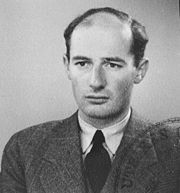 The Swedish Diplomat Raoul Wallenberg saved the lives of tens of thousands of Jews in Budapest during World War II.
The Swedish Diplomat Raoul Wallenberg saved the lives of tens of thousands of Jews in Budapest during World War II.
As Michel Foucault pointed out in his analysis of societal communication and debate, history was mainly the "science of the sovereign", until its inversion by the "historical and political popular discourse".
The Annales School, led by Lucien Febvre, Marc Bloch and Fernand Braudel, would contest the exaggeration of the role of individual subjects in history. Indeed, Braudel distinguished various time scales, one accorded to the life of an individual, another accorded to the life of a few human generations, and the last one to civilizations, in which geography, economics and demography play a role considerably more decisive than that of individual subjects. Foucault's conception of an "archeology" (not to be confused with the anthropological discipline of archaeology) or Louis Althusser's work were attempts at linking together these various heterogeneous layers composing history.[clarification needed]
Among noticeable events in the studies of the role of the hero and Great man in history one should mention Sydney Hook's book The Hero in History [5]
In the epoch of globalization an individual can still change the development of the country and of the whole world so this gives reasons to some scholars to suggest returning to the problem of the role of the hero in history from the viewpoint of modern historical knowledge and using up-to-date methods of historical analysis [6]
Within the frameworks of developing counterfactual history, there are made attempts to examine some hypothetic scenarios of historical development. And the hero attracts much attention because most of those scenarios are based on the suppositions: what would have happened if this or that historical individual had or had not been alive [7]
Heroic myth
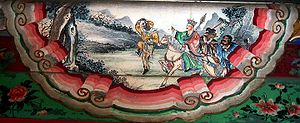 The four heroes from the Chinese classic Journey to the West
The four heroes from the Chinese classic Journey to the West
The concept of a story archetype of the standard "hero's quest" or monomyth pervasive across all cultures is somewhat controversial. Expounded mainly by Joseph Campbell in The Hero with a Thousand Faces, it illustrates several uniting themes of hero stories that hold similar ideas of what a hero represents, despite vastly different cultures and beliefs.[citation needed]
Folk and fairy tales
Vladimir Propp, in his analysis of the Russian fairy tale, concluded that a fairy tale had only eight dramatis personæ, of which one was the hero,[8]:p. 80 and his analysis has been widely applied to non-Russian folklore. The actions that fall into a such hero's sphere include:
- Departure on a quest
- Reacting to the test of a donor
- Marrying a princess (or similar figure)
He distinguished between seekers and victim-heroes. A villain could initiate the issue by kidnapping the hero or driving him out; these were victim-heroes. On the other hand, a villain could rob the hero, or kidnap someone close to him, or, without the villain's intervention, the hero could realize that he lacked something and set out to find it; these heroes are seekers. Victims may appear in tales with seeker heroes, but the tale does not follow them both.[8]:36
The modern fictional hero
Hero or heroine is sometimes used to simply describe the protagonist of a story, or the love interest, a usage which can conflict with the superhuman expectations of heroism. William Makepeace Thackeray gave Vanity Fair the subtitle A Novel without a Hero.[9] The larger-than-life hero is a more common feature of fantasy (particularly sword and sorcery and epic fantasy) than more realist works.[10]
In modern movies, the hero is often simply an ordinary person in extraordinary circumstances, who, despite the odds being stacked against him or her, typically prevails in the end. In some movies (especially action movies), a hero may exhibit characteristics such as superhuman strength and endurance that sometimes makes him nearly invincible. Often a hero in these situations has a foil, the villain, typically a charismatic evildoer who represents, leads, or himself embodies the struggle the hero is up against. Post-modern fictional works have fomented the increased popularity of the antihero, who does not follow common conceptions of heroism.
Hero as self
It has been suggested in an article by Roma Chatterji"[11] that the hero or more generally protagonist is first and foremost a symbolic representation of the person who is experiencing the story while reading, listening or watching; thus the relevance of the hero to the individual relies a great deal on how much similarity there is between the two. One reason for the hero-as-self interpretation of stories and myths is the human inability to view the world from any perspective but a personal one.
See also
- Action hero
- List of female action heroes
- List of male action heroes
- Antihero
- Byronic hero
- Culture hero
- Folk hero
- Germanic hero
- Reluctant hero
- Romantic hero
- Superhero
- Tragic hero
- Youxia
- List of genres
References
- ^ See Heros, Henry George Liddell, Robert Scott, 'A Greek-English Lexicon', at Perseus and Plato, 'Cratylus'
- ^ ἥρως, Henry George Liddell, Robert Scott, A Greek-English Lexicon, on Perseus Digital Library
- ^ Hero: Online Etymology Dictionary, entry "Hero"
- ^ Spencer, Herbert. The Study of Sociology, Appleton, 1896, p. 34.
- ^ Hook, S. 1955[1943]. The Hero in History. A Study in Limitation and Possibility. Boston, MA: Beacon Press.
- ^ Grinin, Leonid 2010. The Role of an Individual in History: A Reconsideration. Social Evolution & History, Vol. 9 No. 2 (pp. 95–136)[1]
- ^ Thompson. W. The Lead Economy Sequence in World Politics (From Sung China to the United States): Selected Counterfactuals. Journal of Globalization Studies. Vol. 1, num. 1. 2010. PP. 6–28 [2]
- ^ a b Vladimir Propp, Morphology of the Folk Tale, ISBN 0-292-78376-0
- ^ Northrop Frye, Anatomy of Criticism, p 34, ISBN 0-691-01298-9
- ^ L. Sprague de Camp, Literary Swordsmen and Sorcerers: The Makers of Heroic Fantasy, p 5 ISBN 0-87054-076-9
- ^ Chatterji, Roma (1986). The Voyage of the Hero: The Self and the Other in One Narrative Tradition of Purulia, Contributions to Indian Sociology 19: 95–114. http://dx.doi.org/10.1177%2F006996685019001007.
Further reading
- Allison, Scott (2010). Heroes: What They Do and Why We Need Them. Richmond, Virginia: Oxford University Press.
- Burkert, Walter (1985). "The dead, heroes and chthonic gods". Greek Religion. Cambridge: Harvard University Press.
- Calder, Jenni (1977). Heroes. From Byron to Guevara. London: Hamish Hamilton. ISBN 241-89536.
- Campbell, Joseph (1949). The Hero with a Thousand Faces. Princeton: Princeton University Press.
- Chatterji, Roma (1986). "The Voyage of the Hero: The Self and the Other in One Narrative Tradition of Purulia". Contributions to Indian Sociology 19: 95–114. doi:10.1177/006996685019001007.
- Craig, David, Back Home, Life Magazine-Special Issue, Volume 8, Number 6, 85-94.
- Dundes, Alan; Otto Rank, and Lord Raglan (1990). In Quest of the Hero. Princeton: Princeton University Press.
- Hadas, Moses; Morton Smith (1965). Heroes and Gods. Harper & Row.
- Hein, David (1993). "The Death of Heroes, the Recovery of the Heroic." Christian Century 110: 1298-1303. http://www.findarticles.com/p/articles/mi_m1058/is_n37_v110/ai_14739320 or http://www.questia.com/PM.qst?a=o&d=5000242002
- Kerenyi, Karl (1959). The Heroes of the Greeks. London: Thames & Hudson.
- Khan, Sharif (2004). Psychology of the Hero Soul..
- Lord Raglan (1936/2003). The Hero: A Study in Tradition, Myth and Drama. Mineola, NY: Dover Publications.
- Henry Liddell and Robert Scott. A Greek-English Lexicon http://www.perseus.tufts.edu/cgi-bin/ptext?doc=Perseus%3Atext%3A1999.04.0057
- Rohde, Erwin (1924). Psyche.
- Smidchens, Guntis (2007). "National Heroic Narratives in the Baltics as a Source for Nonviolent Political Action". Slavic Review 66,3: 484–508.
External links
- The British Hero - online exhibition from screenonline, a website of the British Film Institute, looking at British heroes of film and television.
- Listen to BBC Radio 4's In Our Time programme on Heroism
Categories:- Mythological archetypes
- Mythological characters
- Fantasy tropes
- Hero
- Heroes by role
- Literary archetypes
- Greek loanwords
- Jungian archetypes
Wikimedia Foundation. 2010.

